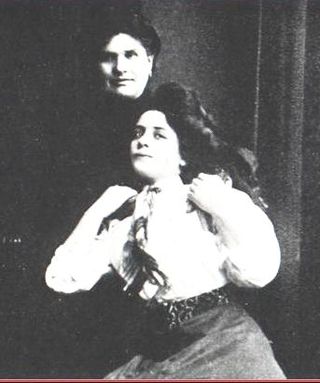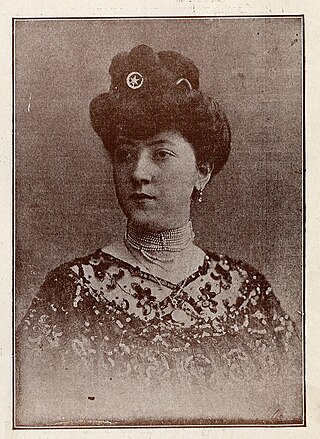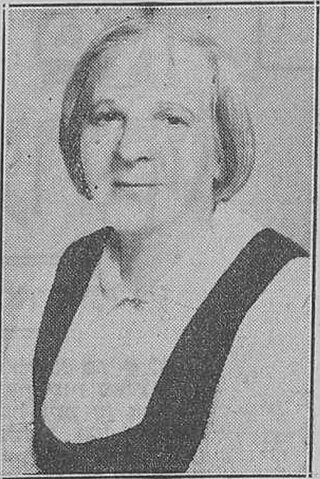Related Research Articles

The Forward, formerly known as The Jewish Daily Forward, is an American news media organization for a Jewish American audience. Founded in 1897 as a Yiddish-language daily socialist newspaper, The New York Times reported that Seth Lipsky "started an English-language offshoot of the Yiddish-language newspaper" as a weekly newspaper in 1990.

Abraham "Abe" Cahan was a Lithuanian-born Jewish American socialist newspaper editor, novelist, and politician. Cahan was one of the founders of The Forward, an American Yiddish publication, and was its editor-in-chief for 43 years. During his stewardship of the Forward, it became a prominent voice in the Jewish community and in the Socialist Party of America, voicing a relatively moderate stance within the realm of American socialist politics.

Yankev Shternberg was a Yiddish theater director, teacher of theater, playwright, avant-garde poet and short-story writer, best known for his theater work in Romania between the two world wars.

Chaim Grade was one of the leading Yiddish writers of the twentieth century.
Shira Gorshman was a Yiddish language short story writer and memoirist.
Dos Abend Blatt was a Yiddish-language daily newspaper published in New York City, United States. Dos Abend Blatt was launched as an outgrowth of the weekly Di Arbeter Tsaytung. Published between 1894 and 1902, it was an organ of the Socialist Labor Party of America (SLP).
During the nine decades since its establishment in 1919, the Communist Party USA produced or inspired a vast array of newspapers and magazines in at least 25 different languages. This list of the Non-English press of the Communist Party USA provides basic information on each title, along with links to pages dealing with specific publications in greater depth.

Avrom Reyzen, known as Abraham Reisen, was a Belorussian Jewish-American writer, poet and editor. He was the elder brother of the Yiddishist Zalman Reisen.

Clara Young was a Yiddish theatrical actor. Born to parents who loved the stage, she spent her early years in a home that housed rehearsals of traveling Yiddish theater troupes. After her father's death, the family went to America, where she soon joined the Tantsman company and went to Boston, there to Zolotarevski's troupe in Montreal, thence to Toronto and to Morris Finkel's theater in Philadelphia.

Der Tog was a Yiddish-language daily newspaper published in New York City from 1914 until 1971. The offices of Der Tog were located on the Lower East Side, at 185 and 187 East Broadway.
Saul M. Ginsburg was a Jewish-Belarusian American author, editor, and historian of Russian Jewry.
Nahum Stutchkoff, was a Yiddish-Polish and later Yiddish-American actor, author, lexicographer, and radio host. The largest Yiddish dictionary ever to be finished was compiled by him: the Oytser fun der yidisher shprakh.

Vera Rozanka, was a Ukrainian Yiddish Theatre actor and manager, soprano, writer, radio performer, and recording artist. During her career, she shared the stage with many notables of the Yiddish Theatre world, including Aaron Lebedeff, Ben Bonus, Fraydele Oysher, Miriam Kressyn and Menasha Skulnik. Among her typical acts were to perform as non-Jewish Russian, Ukrainian or Romani characters in folk costumes, performing under the name "the yiddishe shikse" (Shiksa).

Philip Laskowsky was a Polish-born American composer, arranger, bandleader, comedian and actor of the Yiddish theatre. He collaborated with a number of well-known figures of the American Yiddish theatre such as Boris Thomashefsky, Louis Gilrod, Isidore Lillian, Jacob Jacobs, and Rubin Doctor. He is sometimes credited with having written the music for the well-known Yiddish song Oyfn veg shteyt a boym, although this is disputed.
Jacob Adler, also known by his pen name B. Kovner, was a native of Austria-Hungary and a Galician Jew who became a Yiddish language writer, poet, and humorist in the United States.

Regina Zuckerberg was an Austrian-born Yiddish theatre actor and Prima donna who had a career both in Europe and the United States.

Rakhel Feygenberg, often known by her Hebrew pen name Rakhel Imri, was a Russian-born Israeli writer, playwright, translator and journalist who wrote in both Yiddish and Hebrew. She wrote and published prolifically from the early 1900s to the 1960s.

Clara Gold was an American Yiddish theatre actor and recording artist. She recorded more than twenty Yiddish theatre music and comedy discs between 1917 and 1929, usually with comedic partner Gus Goldstein.

Miriam Raskin was a Yiddish-language writer.
References
- ↑ Kellman, Ellen (2021-06-23). "Miriam Karpilove". Jewish Women's Archive. Retrieved 2024-05-09.
- ↑ Kirzane, Jessica. "Miriam Karpilove, Photographic Retoucherin | Yiddish Book Center". www.yiddishbookcenter.org. Retrieved 2024-05-24.
- ↑ Karpilove, Miriam (2023-09-15). A Provincial Newspaper and Other Stories. Syracuse University Press. ISBN 978-0-8156-5687-6.
- ↑ Brinn, Ayelet (2023). A Revolution in Type: Gender and the Making of the American Yiddish Press. NYU Press. ISBN 9781479817672.
- ↑ Corrsin, Stephen D. (2012). Jews in America: From New Amsterdam to the Yiddish Stage. The New York Public Library. p. 138.
- ↑ Wirth-Nesher, Hana, ed. (2015). The Cambridge history of Jewish American literature. Cambridge University Press. p. 403.
- ↑ "Women Organize for Jewish Congress". The American Jewish Chronicle. 1 (8): 252. June 30, 1916.